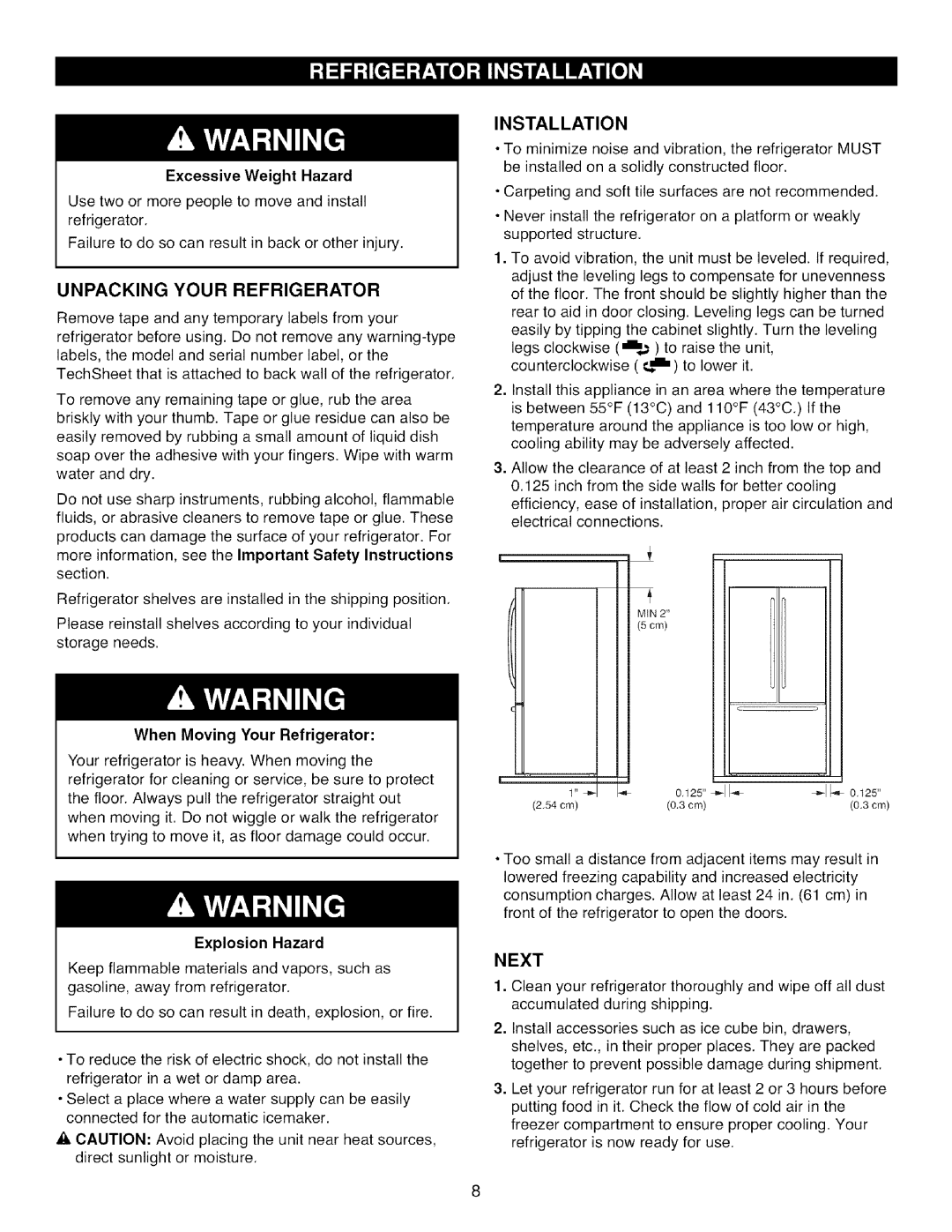
Excessive Weight Hazard
Use two or more people to move and install refrigerator.
Failure to do so can result in back or other injury.
UNPACKING YOUR REFRIGERATOR
Remove tape and any temporary labels from your refrigerator before using. Do not remove any
To remove any remaining tape or glue, rub the area briskly with your thumb. Tape or glue residue can also be easily removed by rubbing a small amount of liquid dish soap over the adhesive with your fingers. Wipe with warm water and dry.
Do not use sharp instruments, rubbing alcohol, flammable fluids, or abrasive cleaners to remove tape or glue. These products can damage the surface of your refrigerator. For more information, see the Important Safety Instructions section.
Refrigerator shelves are installed in the shipping position.
Please reinstall shelves according to your individual storage needs.
When Moving Your Refrigerator:
Your refrigerator is heavy. When moving the refrigerator for cleaning or service, be sure to protect the floor. Always pull the refrigerator straight out when moving it. Do not wiggle or walk the refrigerator when trying to move it, as floor damage could occur.
Explosion Hazard
Keep flammable materials and vapors, such as gasoline, away from refrigerator.
Failure to do so can result in death, explosion, or fire.
•To reduce the risk of electric shock, do not install the refrigerator in a wet or damp area.
•Select a place where a water supply can be easily connected for the automatic icemaker.
A CAUTION: Avoid placing the unit near heat sources, direct sunlight or moisture.
INSTALLATION
•To minimize noise and vibration, the refrigerator MUST be installed on a solidly constructed floor.
•Carpeting and soft tile surfaces are not recommended.
•Never install the refrigerator on a platform or weakly supported structure.
1.To avoid vibration, the unit must be leveled. If required, adjust the leveling legs to compensate for unevenness of the floor. The front should be slightly higher than the
rear to aid in door closing. Leveling legs can be turned easily by tipping the cabinet slightly. Turn the leveling
legs clockwise (_) to raise the unit, counterclockwise ( _,"=") to lower it.
2.Install this appliance in an area where the temperature is between 55°F (13°C) and 110°F (43°C.) If the temperature around the appliance is too low or high, cooling ability may be adversely affected.
3.Allow the clearance of at least 2 inch from the top and 0.125 inch from the side walls for better cooling efficiency, ease of installation, proper air circulation and electrical connections.
E | m | |
1" 4_- |
| |
(2.54 cm) | (0.3 cm) | (0.3 cm) |
•Too small a distance from adjacent items may result in lowered freezing capability and increased electricity consumption charges. Allow at least 24 in. (61 cm) in front of the refrigerator to open the doors.
NEXT
1.Clean your refrigerator thoroughly and wipe off all dust accumulated during shipping.
2.Install accessories such as ice cube bin, drawers, shelves, etc., in their proper places. They are packed together to prevent possible damage during shipment.
3.Let your refrigerator run for at least 2 or 3 hours before putting food in it. Check the flow of cold air in the freezer compartment to ensure proper cooling. Your refrigerator is now ready for use.
